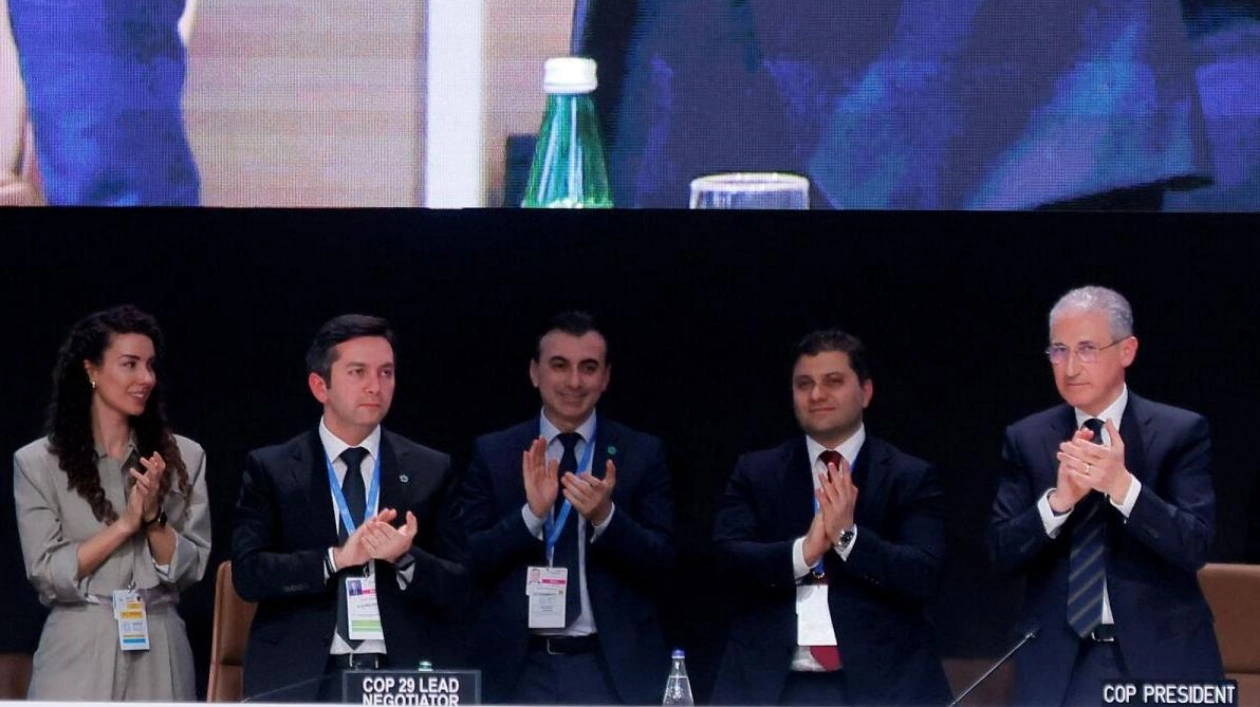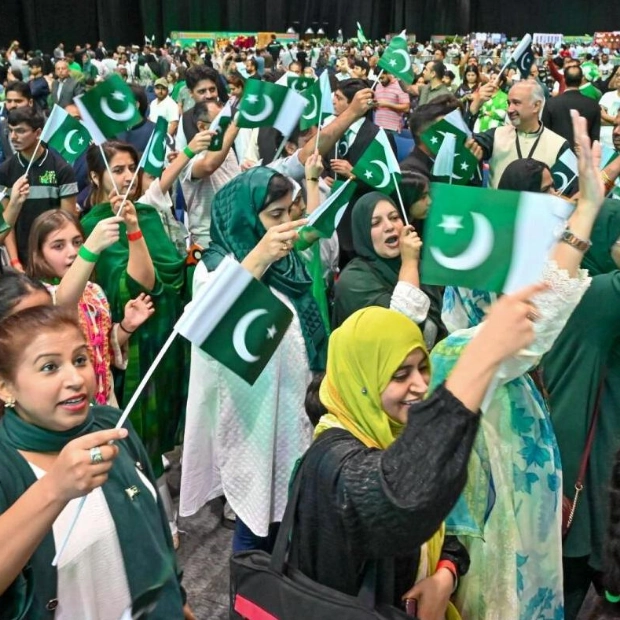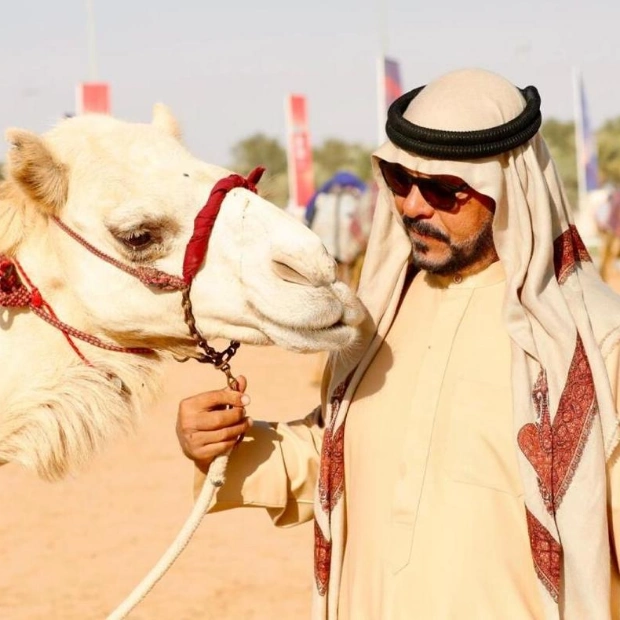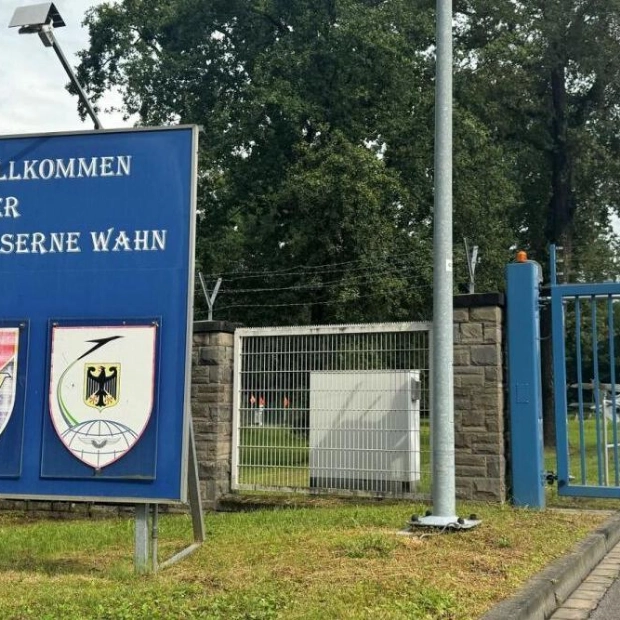COP29 President Mukhtar Babayev and COP29 United Nations Climate Change Conference Lead Negotiator Yalchin Rafiyev applaud during a closing plenary meeting at the COP29 United Nations Climate Change Conference in Baku, Azerbaijan, on Sunday. — Reuters
The global community endorsed a fiercely debated climate agreement on Sunday, but poorer nations, most vulnerable to escalating climate disasters, deemed a $300 billion annual pledge from wealthy, historically polluting countries as woefully inadequate. After two grueling weeks of tumultuous negotiations and sleepless nights, nearly 200 countries managed to pass the contentious financial agreement in the early hours at a sports stadium in Azerbaijan. However, the applause was short-lived as India vehemently rejected the 'abysmally poor' deal, sparking a wave of criticism from developing nations. 'It's a paltry sum,' declared India's delegate Chandni Raina. 'This document is little more than an optical illusion. This, in our opinion, will not address the enormity of the challenge we all face.' Sierra Leone's climate minister Jiwoh Abdulai expressed that it reflected a 'lack of goodwill' from rich countries to support the world's poorest as they face rising seas and more severe droughts. Nigeria's envoy Nkiruka Maduekwe was even more blunt: 'This is an insult.'
Some countries accused Azerbaijan, an oil and gas exporter, of failing to rise to the occasion in a year marked by costly climate disasters and on track to be the hottest on record. However, throughout COP29, developed nations—major economies like the European Union, the United States, and Japan—were accused of negotiating in bad faith, making a fair deal impossible. Developing nations arrived in Baku, hoping to secure a significant financial boost from rich countries, far exceeding their existing pledge of $100 billion annually. Tina Stege, climate envoy for the Marshall Islands, said she would return home with only a 'small portion' of what she fought for, but not empty-handed. 'It isn't nearly enough, but it's a start,' said Stege, whose atoll nation faces an existential threat from rising sea levels.
Nations struggled at COP29 to reconcile long-standing divisions over how much developed nations, most responsible for historical greenhouse gas emissions, should provide to poorer countries, least responsible but most impacted by rapid global warming. The meeting also saw delays on the promise to 'transition away' from fossil fuels, the primary driver of global heating. That pledge, a key achievement of COP28 in Dubai, was omitted from the final Baku deal. The Least Developed Countries bloc of 45 nations condemned the COP29 outcome as a 'travesty,' stating it failed to make progress on curbing warming or delivering sufficient funds to protect the most vulnerable. 'This is not just a failure; it is a betrayal,' the group said in a statement.
Nations have agreed to strive to limit temperature rise to 1.5 degrees Celsius above preindustrial levels. Currently, the world is on track for devastating warming of between 2.6C and 3.1C this century, according to the UN. UN Secretary-General Antonio Guterres expressed his hope for a more ambitious outcome and urged governments to view it as a starting point. Developed countries only put the $300 billion figure on the table on Saturday after COP29 went into extra time, and diplomats worked through the night to improve an earlier rejected offer. Bleary-eyed diplomats, huddled anxiously in groups, were still refining the final wording on the plenary floor in the dying hours before the deal passed. UK Energy Secretary Ed Miliband hailed it as 'a critical eleventh-hour deal at the eleventh hour for the climate.'
At points, the talks appeared on the brink of collapse. Delegates stormed out of meetings, exchanged harsh words, and threatened to walk away from the negotiating table if rich nations did not increase their financial commitment. In the end—despite repeatedly stating that 'no deal is better than a bad deal'—developing nations did not obstruct the agreement. US President Joe Biden characterized the agreement reached in Baku as a 'historic outcome.' EU climate envoy Wopke Hoekstra said it would be remembered as 'the start of a new era for climate finance.' The agreement commits developed nations to pay at least $300 billion annually by 2035 to help developing countries reduce emissions and prepare for worsening disasters. It falls short of the $390 billion that economists commissioned by the United Nations deemed a fair share contribution by developed nations.
The US and EU pushed for newly wealthy emerging economies like China—the world's largest emitter—to contribute. Wealthy nations argued it was politically unrealistic to expect more direct government funding amid geopolitical uncertainty and economic belt-tightening. Donald Trump, a skeptic of both climate change and foreign assistance, was elected just days before COP29 began, casting a shadow over the UN talks. Other countries, particularly in the EU—the largest contributor of climate finance—faced right-wing backlash against the green agenda, making it difficult to raise large sums of public money. The final deal 'encourages' developing countries to make contributions on a voluntary basis, reflecting no change for China, which already provides climate finance on its own terms. The deal also sets a larger overall target of $1.3 trillion annually to cope with rising temperatures and disasters, but most would come from private sources.
Source link: https://www.khaleejtimes.com






